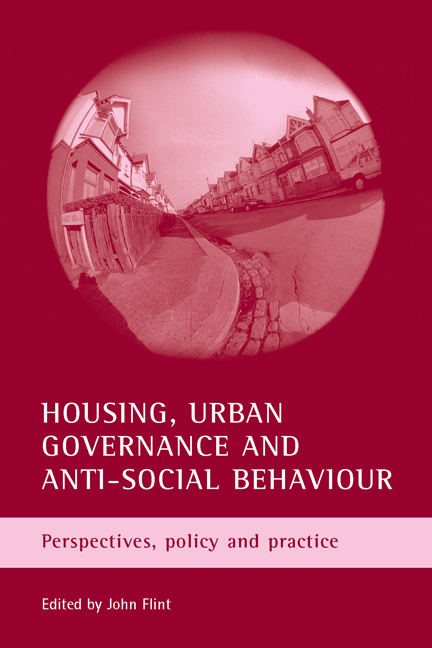Book contents
- Frontmatter
- Contents
- List of tables, figures and photographs
- Acknowledgements
- Notes on contributors
- Introduction
- Part 1 The definition and construction of anti-social behaviour in the UK
- Part 2 Legal techniques and measures utilised by social landlords to address anti-social behaviour
- Part 3 The emerging mechanisms of addressing anti-social behaviour in housing governance
- Part 4 Studies of housing and anti-social behaviour from an international perspective
- Index
fourteen - Testing urban forms: city, control and ‘urban violence’ in France
Published online by Cambridge University Press: 15 January 2022
- Frontmatter
- Contents
- List of tables, figures and photographs
- Acknowledgements
- Notes on contributors
- Introduction
- Part 1 The definition and construction of anti-social behaviour in the UK
- Part 2 Legal techniques and measures utilised by social landlords to address anti-social behaviour
- Part 3 The emerging mechanisms of addressing anti-social behaviour in housing governance
- Part 4 Studies of housing and anti-social behaviour from an international perspective
- Index
Summary
Introduction
The prolonged riots and disturbances in several French cities in October and November 2005 focused attention on urban tensions and disorder among young people, and particularly minority ethnic groups, living in deprived peripheral housing estates; while President Chirac’s response calling for renewed ‘respect’ mirrored the language of Prime Minister Tony Blair in the UK (Henley, 2005). The term ‘urban violence’ is one of the dominant contemporary expressions used in France to describe and define society and the deviant behaviour of some of its members in particular locations. It offers a suitable conceptual framework for understanding the specific nature of national approaches to addressing issues of disorder and anti-social behaviour (ASB). This chapter examines the historical development of conceptualisations of urban violence in France and links these to changing urban environments, the cultures and circumstances of young people and evolving city policies and urban governance structures.
The concept of urban violence
The concept of urban violence, like the concept of ASB discussed in other contributions to this volume, combines numerous categories of sometimes very different phenomena1. This concept ascribes a category of actions to a category of locations, reactivating the Babylonian myth of the city as the place of evil and all vices. ‘Violence, from time immemorial, was known as new, upward and urban’ (Chesnais, 1981, p 431). To understand current French politics, they must be looked at in this context, because they represent a moment within longer historical dynamics which have in large part led to a redefining of the social questions previously concerned with ‘exploited workers’ to a set of new urban questions based on ‘zones of exclusion’ (Donzelot and Mongin, 1999).
Viewing the transformations of French society at the end of the 1970s, Castells, looking back to the words of Marx, posed the question ‘a new spectre haunts the world: will the urban crisis become an urban revolution?’ (Castells et al, 1978, p 7). Since the Second World War, France has experienced radical transformation. The rise in the power of state town planning and development activity including the construction of new housing schemes resulted in the replacement of existing society by an urban one that exceeded all the hopes of social reformers at the beginning of the 20th century (Magri and Topalov, 1987).
- Type
- Chapter
- Information
- Housing, Urban Governance and Anti-Social BehaviourPerspectives, Policy and Practice, pp. 281 - 300Publisher: Bristol University PressPrint publication year: 2006



